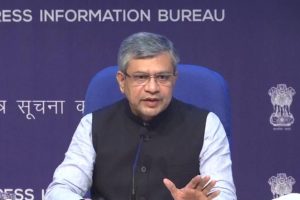Union Minister Ashwini Vaishnaw showcased significant progress made by India in the semiconductor sector at the SEMICON India summit being held at the India Expo Mart.
Highlighting India’s rapid developments, Vaishnaw said, “In a very short time frame, 5 semiconductor units have been approved. Construction is rapidly under progress in the micron unit, the Morigaon Tata unit, the construction has started and in the other three units, the construction will start soon.”
He further emphasized the government’s focus on talent development, revealing that India aims to build a robust talent pool.
“We have committed to develop a strong talent tool of 85000 engineers and technicians in next 10 years and we have delivered on a promise for this purpose already, 113 universities, academic institutions and R&D organisations have been tied up, where semiconductor focused course curriculum is been taught and the course curriculum have been designed by the industry participants,” Vaishnaw said.
Highlighting the success of the Lam Research Semiverse programme, Vaishnaw stated , “We have the Lam research semiverse programme, which is now running across 74 universities and has already trained 2600 students this year. The programme is going to be scaled up in a massive way in the coming years.”
He added, “AMB has already inaugurated its first global design centre in Bengaluru which has about 5000 engineers and the next phase will be bigger than this. Applied materials has commissioned the first India validation centre.”
Among the other milestones shared, Vaishnaw noted that AMB has inaugurated its first global design centre in Bengaluru, employing around 5,000 engineers, with the next phase of expansion expected to be even larger.
Additionally, Applied Materials has commissioned its first India validation centre.
He said, “The focus on the design ecosystem is the critical aspect of the semiconductor India programme. We have more than 300,000 engineers working in the design ecosystem for various companies and about 52000 are working on really leading edge and complex chips.”
“Our focus on design ecosystem development will lead to at least 3 or 4 major projects in the coming years. Already 13 design ecosystem partners who have received financial assistance from the India semiconductor programme have started developing and 4 of them have started getting VC interest and 2 of them have started getting funds from the venture capital (VC) industry”, Vaishnaw added.
Vaishnaw also outlined the broader impact of establishing semiconductor units, emphasizing their role in driving exponential growth across industries such as automobile, medical, industrial, transport, and consumer electronics. E
He said, “Establishing the semiconductor units will drive an exponential growth in the automobile, medical, industrial, transport, consumer electronics, practically every manufacturing sector.”
“Prime Minister Narendra Modi’s vision is to democratise access to technology. All the initiatives taken so far whether it is the digital india mission, the telecom mission, everything has brought the technology into the hands of the common citizen”, Vaishnaw added.




